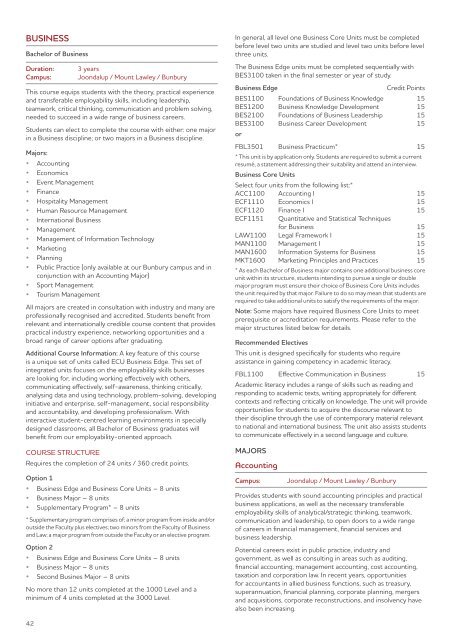Undergraduate-international-course-guide
Undergraduate-international-course-guide
Undergraduate-international-course-guide
Create successful ePaper yourself
Turn your PDF publications into a flip-book with our unique Google optimized e-Paper software.
usiness<br />
bachelor of business<br />
Duration: 3 years<br />
campus: Joondalup / Mount Lawley / Bunbury<br />
This <strong>course</strong> equips students with the theory, practical experience<br />
and transferable employability skills, including leadership,<br />
teamwork, critical thinking, communication and problem solving,<br />
needed to succeed in a wide range of business careers.<br />
Students can elect to complete the <strong>course</strong> with either: one major<br />
in a Business discipline; or two majors in a Business discipline.<br />
Majors:<br />
y Accounting<br />
y Economics<br />
y Event Management<br />
y Finance<br />
y Hospitality Management<br />
y Human Resource Management<br />
y International Business<br />
y Management<br />
y Management of Information Technology<br />
y Marketing<br />
y Planning<br />
y Public Practice (only available at our Bunbury campus and in<br />
conjunction with an Accounting Major)<br />
y Sport Management<br />
y Tourism Management<br />
All majors are created in consultation with industry and many are<br />
professionally recognised and accredited. Students benefit from<br />
relevant and <strong>international</strong>ly credible <strong>course</strong> content that provides<br />
practical industry experience, networking opportunities and a<br />
broad range of career options after graduating.<br />
Additional <strong>course</strong> Information: A key feature of this <strong>course</strong><br />
is a unique set of units called ECU Business Edge. This set of<br />
integrated units focuses on the employability skills businesses<br />
are looking for, including working effectively with others,<br />
communicating effectively, self-awareness, thinking critically,<br />
analysing data and using technology, problem-solving, developing<br />
initiative and enterprise, self-management, social responsibility<br />
and accountability, and developing professionalism. With<br />
interactive student-centred learning environments in specially<br />
designed classrooms, all Bachelor of Business graduates will<br />
benefit from our employability-oriented approach.<br />
CourSe StruCture<br />
Requires the completion of 24 units / 360 credit points.<br />
option 1<br />
y Business Edge and Business Core Units – 8 units<br />
y Business Major – 8 units<br />
y Supplementary Program* – 8 units<br />
* Supplementary program comprises of; a minor program from inside and/or<br />
outside the Faculty plus electives; two minors from the Faculty of Business<br />
and Law; a major program from outside the Faculty or an elective program.<br />
option 2<br />
y Business Edge and Business Core Units – 8 units<br />
y Business Major – 8 units<br />
y Second Busines Major – 8 units<br />
No more than 12 units completed at the 1000 Level and a<br />
minimum of 4 units completed at the 3000 Level.<br />
42<br />
In general, all level one Business Core Units must be completed<br />
before level two units are studied and level two units before level<br />
three units.<br />
The Business Edge units must be completed sequentially with<br />
BES3100 taken in the final semester or year of study.<br />
business Edge Credit Points<br />
BES1100 Foundations of Business Knowledge 15<br />
BES1200 Business Knowledge Development 15<br />
BES2100 Foundations of Business Leadership 15<br />
BES3100<br />
or<br />
Business Career Development 15<br />
FBL3501 Business Practicum* 15<br />
* This unit is by application only. Students are required to submit a current<br />
resumé, a statement addressing their suitability and attend an interview.<br />
business core units<br />
Select four units from the following list:*<br />
ACC1100 Accounting I 15<br />
ECF1110 Economics I 15<br />
ECF1120 Finance I 15<br />
ECF1151 Quantitative and Statistical Techniques<br />
for Business 15<br />
LAW1100 Legal Framework I 15<br />
MAN1100 Management I 15<br />
MAN1600 Information Systems for Business 15<br />
MKT1600 Marketing Principles and Practices 15<br />
* As each Bachelor of Business major contains one additional business core<br />
unit within its structure, students intending to pursue a single or double<br />
major program must ensure their choice of Business Core Units includes<br />
the unit required by that major. Failure to do so may mean that students are<br />
required to take additional units to satisfy the requirements of the major.<br />
Note: Some majors have required Business Core Units to meet<br />
prerequisite or accreditation requirements. Please refer to the<br />
major structures listed below for details.<br />
Recommended Electives<br />
This unit is designed specifically for students who require<br />
assistance in gaining competency in academic literacy.<br />
FBL1100 Effective Communication in Business 15<br />
Academic literacy includes a range of skills such as reading and<br />
responding to academic texts, writing appropriately for different<br />
contexts and reflecting critically on knowledge. The unit will provide<br />
opportunities for students to acquire the dis<strong>course</strong> relevant to<br />
their discipline through the use of contemporary material relevant<br />
to national and <strong>international</strong> business. The unit also assists students<br />
to communicate effectively in a second language and culture.<br />
MAJoRS<br />
accounting<br />
campus: Joondalup / Mount Lawley / Bunbury<br />
Provides students with sound accounting principles and practical<br />
business applications, as well as the necessary transferable<br />
employability skills of analytical/strategic thinking, teamwork,<br />
communication and leadership, to open doors to a wide range<br />
of careers in financial management, financial services and<br />
business leadership.<br />
Potential careers exist in public practice, industry and<br />
government, as well as consulting in areas such as auditing,<br />
financial accounting, management accounting, cost accounting,<br />
taxation and corporation law. In recent years, opportunities<br />
for accountants in allied business functions, such as treasury,<br />
superannuation, financial planning, corporate planning, mergers<br />
and acquisitions, corporate reconstructions, and insolvency have<br />
also been increasing.


